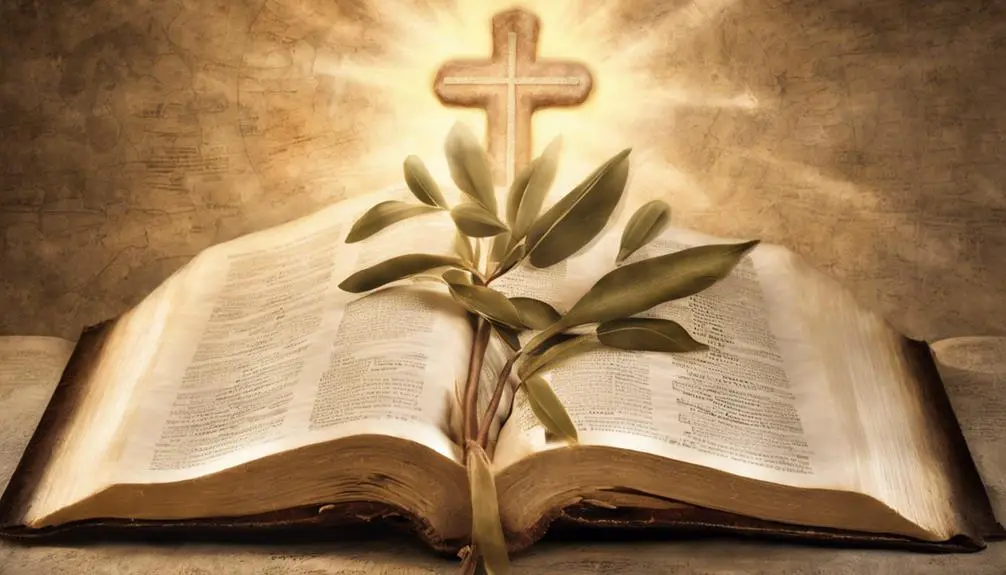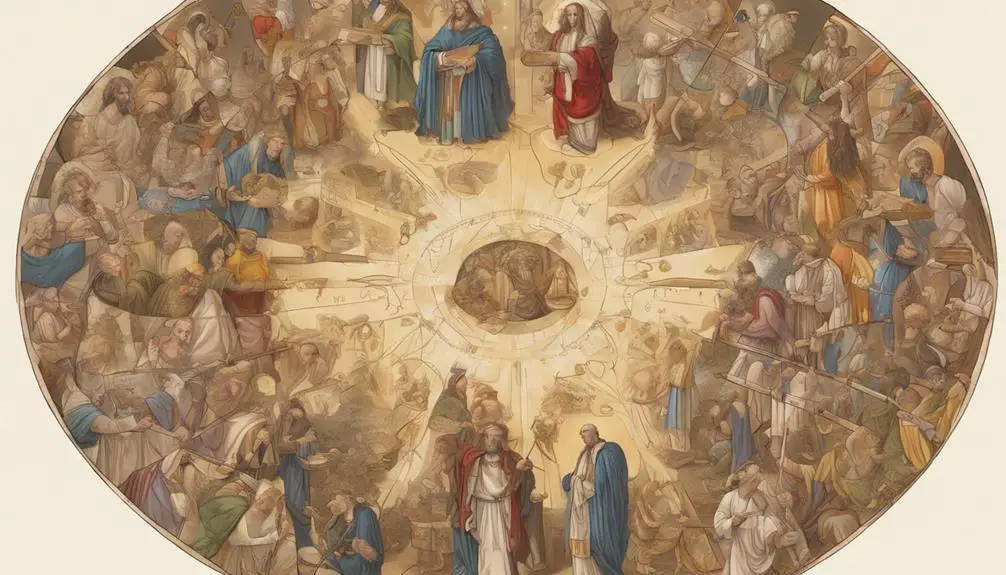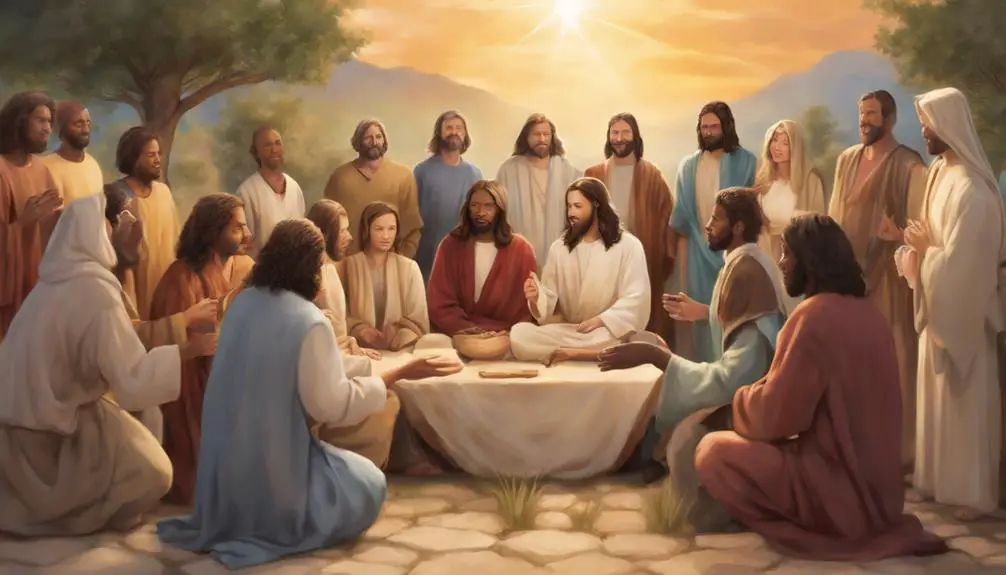Yield to the mystery of the number 15 in the Bible and uncover its hidden, symbolic meanings that could deepen your understanding of biblical texts.

15 in the Bible Meaning
Have you ever considered the significance of the number 15 in the Bible?
It's intriguing how certain numbers hold symbolic meaning in biblical texts, with 15 being one such number.
Notice how it appears in critical moments, such as Hezekiah's life extension by 15 years or the 15 Songs of Ascents in Psalms.
The question is, does it merely represent a numerical value, or does it carry a profound symbolic meaning?
This inquiry could lead us down a path of surprising discoveries and deeper comprehension of biblical texts.
Key Takeaways
- The number 15 in the Bible symbolizes divine grace, salvation, and change in prophetic literature.
- Various biblical figures and events, such as Paul, Hezekiah, and Noah's Ark, are associated with the number 15.
- The 15th day in certain religious observances and celebrations holds significant meaning in the Bible.
- Prophetic mysteries of the number 15 imply themes of judgment, redemption, and the perfect grace of Christ.
The Meaning of Numbers in the Bible

In the Bible, every number holds a specific symbolism and significance, providing a unique spiritual perspective that can enrich your understanding of scripture. This divine interpretation is a result of numerology influence, a notable component of biblical studies.
Numerology, or the study of numbers, creates a distinct lens for you to interpret biblical narratives. This isn't about predicting your future or reading your personality; it's about uncovering the deeper, symbolic meanings embedded in the Holy text.
Each number, from one to thousands, carries a specific vibration, a pattern if you will, that resonates with the divine energy. For instance, while 'seven' is often associated with divine perfection and completion, 'twelve' signifies God's power and authority.
These numerological influences aren't mere coincidences, but intentional placements, offering unique insights into the divine interpretation of the scripture. They're like invisible threads weaving together the spiritual and the physical world, reflecting the essence of God's grand design.
Whether you're a scholar, a believer, or a curious reader, understanding biblical numerology can deepen your appreciation of the scripture. It's not just about the words or the characters, but also the numbers – they too, tell a story.
Biblical Significance of the Number 15

Delving into the biblical significance of the number 15, you'll discover it's often associated with acts of divine grace and salvation. The number 15 carries a rich undercurrent of symbolism, and you'll find it intriguing how it's strategically used in various biblical contexts.
- Fifteenth Apostle Significance: Some scholars propose that Paul, often considered the fifteenth apostle, exemplifies God's grace. Despite his initial persecution of Christians, God's grace transformed him into a pivotal figure in spreading the gospel.
- Fifteen Commandments Controversy: An incident in Exodus sparked a debate about fifteen commandments instead of ten. Moses received two tablets from God, with the first having five commandments and the second ten. The controversy lies in the possibility that the first five were separate, making a total of fifteen.
- Hezekiah's Life Extension: In 2 Kings 20, God extended King Hezekiah's life by fifteen years as an act of divine grace.
- Feast of Unleavened Bread: This significant Jewish festival begins on the fifteenth day of Nisan, symbolizing the Israelites' salvation from Egypt.
The number 15's biblical significance is complex, but it's clear that it's intricately connected to grace and salvation.
Fifteen in the Genesis Flood Narrative

Shifting our focus to the Genesis Flood narrative, you'll notice the number fifteen also holds significance, marking a pivotal moment in this ancient tale. It's noted in the text that after the onset of the rain, it took fifteen days for the waters to cover the earth, a period known as the 'Flood Duration'. This timeframe isn't random but a deliberate detail in the narrative.
The number fifteen is also significant in the 'Ark Construction'. Noah's Ark, the vessel that saved humanity and animal species from the flood, is said to have risen fifteen cubits above the highest mountains once the earth was completely submerged. This figure illustrates the magnitude of the catastrophe and the safety provided by the Ark.
In the Genesis Flood narrative, fifteen takes on a dual role. It stands as a symbol of both destruction and salvation. It marks the duration of the flood that wiped out life on earth, yet it also measures the height of the refuge that preserved the remnants of life. This balance between doom and deliverance amplifies the significance of the number fifteen in the narrative.
Hezekiah's Life Extension by 15 Years

Turning your attention to the story of King Hezekiah, you'll find another instance where the number '15' takes on a profound significance; it represents the years added to Hezekiah's life after his faithful prayer to God. This narrative isn't just about the literal extension of Hezekiah's life, it's an account of Hezekiah's faith and divine intervention.
- Hezekiah's Faith: Initially, Hezekiah was informed of his impending death. However, he didn't resign to his fate but turned to God in prayer, demonstrating his unwavering faith.
- Divine Intervention: God, moved by Hezekiah's faith, sent the prophet Isaiah to deliver the good news that He'd add 15 years to Hezekiah's life.
- Significance of 15: The number 15, in this context, symbolizes grace and God's favor. It's not a random figure, but a divine allotment.
- Resultant Effect: The added years allowed Hezekiah to continue his reforms and righteous rule, leaving a significant impact on the kingdom of Judah.
Analyzing this story, you'll see how faith and divine intervention intertwine, with the number '15' serving as a testament to God's grace and mercy. This account serves as a powerful reminder of the transformative power of faith and fervent prayer.
The 15th Day of the Jewish Calendar

Moving from the biblical narrative to the Jewish calendar, you'll find that the number '15' holds considerable importance, specifically on the 15th day of each month. These days are often marked by 15th Day Celebrations, each with its unique significance tied to Jewish history and faith.
Delving into the Jewish Calendar Origins, you'll discover that these celebrations are more than just a mark on the calendar. They're deeply rooted in Jewish culture and tradition, serving as reminders of significant religious events. For instance, the 15th day of the Hebrew month of Nissan is the start of Passover, commemorating the liberation of the Israelites from Egyptian slavery. Similarly, the 15th of Shevat, known as Tu B'Shevat, is celebrated as the 'New Year for Trees'.
These celebrations aren't randomly assigned. They're meticulously calculated based on lunar cycles, a method dating back to ancient times. As you can see, the 15th day isn't just another day in the Jewish calendar. It's a day pulsating with historical significance, a day for joyous celebration, and a day for reflection on past events that have shaped the Jewish faith.
The Number 15 in the Psalms

In the Book of Psalms, the number '15' emerges as a significant figure, bringing with it a depth of spiritual understanding and biblical insight. This number isn't just randomly sprinkled throughout the text, but instead carries a purposeful weight within the Psalms' structure, reflecting David's authorship.
You'll find four main points demonstrating this:
- Authorship: 15 Psalms (Psalms 120-134) are titled 'A song of ascents', which many scholars attribute to David. This signifies David's spiritual growth and ascension, both physically and spiritually.
- Structure: The 15 Psalms of ascents are structured in a way that directs the reader on a spiritual journey, from lament to joy, much like David's own journey.
- Symbolism: The number 15 symbolizes divine grace and God's favor, which David continually seeks and acknowledges in his Psalms.
- Repetition: The repetition of '15' in the book of Psalms serves to emphasize David's reliance on God's grace and the importance of spiritual growth.
Fifteen Cubits Above: Noah's Ark Story

Delving into the story of Noah's Ark, you'll find the significance of '15' highlighted again, specifically when the floodwaters rose fifteen cubits above the highest mountains, a detail that underscores a profound biblical message. The use of the number 15 here isn't mere coincidence. It illustrates a divine intervention, a cleansing of the earth from its impurities and a new beginning for mankind.
Now, let's analyze the cubit measurement accuracy. The cubit, an ancient unit of length, varied among different cultures. However, in Hebrew measure, it was approximately 18 inches or 45 cm. Hence, fifteen cubits would be about 22.5 feet or 6.9 meters. Such accurate measurements in the Bible emphasize the precision involved in the events described, adding authenticity to the narrative.
In relation to Noah's Ark construction, it's clear that the Ark's design was divinely inspired, built to withstand a flood of epic proportions. This flood, fifteen cubits above the highest mountains, was designed not to just submerge the land but to ensure the complete destruction of all life, except what was preserved on the Ark. This detail underscores the significance of obedience, preparation, and divine protection in the face of judgment.
The 15 Steps in the Passover Seder

Shifting our focus to the Jewish Passover Seder, you'll encounter a meticulously structured ritual consisting of 15 steps, each bearing significant symbolism and deep-rooted biblical connections. This ritual underscores the Seder Plate Significance and the Passover Meal Importance, two key aspects that amplify the richness of this tradition.
The 15 steps range from the initial Kadesh, or blessing, to the final Nirtzah, which concludes the Seder. Each step is packed with meaning, reinforcing the gravity of the Passover story.
Let's delve into the symbolism of four of these steps:
- Kadesh: This first step, a blessing over wine, signifies sanctification and the start of the Seder.
- Maggid: The telling of the Exodus story, this step underscores the importance of remembrance and pass down of generational stories.
- Motzi Matzah: This step involves blessing and eating Matzah, symbolizing the haste of the Jews' exodus.
- Tzafun: The last piece of Matzah is eaten, representing the hope and anticipation for the future redemption.
These steps, among others, collectively form the backbone of the Seder, reminding individuals of their historical struggle and eventual liberation, thus enhancing the Passover Meal's importance.
Biblical Characters Connected to 15

Now, let's explore the intriguing connection between the number 15 and certain biblical characters, which further highlights the spiritual significance of this number. You'll notice that the number 15's influence on prophets and other biblical figures is quite profound.
Consider the Prophet Elisha, who performed 15 miracles, each signifying God's divine intervention. These acts weren't only validations of Elisha's prophetic authority, but they also symbolically demonstrated the power of the number 15.
Similarly, King Manasseh, one of Judah's kings, reigned for 55 years, but it was in his 15th year that he drastically changed his ways and turned to God, further highlighting the transformative power of 15.
Yet, 15's influence isn't always positive. The notorious example of Judas Iscariot's betrayal for 15 pieces of silver underscores the dual nature of this number. While it can denote God's grace and mercy, it also symbolizes betrayal and deceit. Judas' act of betrayal is a stark reminder of this dualistic interpretation of the number 15 in the Bible.
The 15th Day of Abib

Another crucial instance of the number 15's prominence in the Bible is seen on the 15th day of Abib, a day that holds significant religious importance. This day is deeply revered because of its link to the Passover, as outlined in Exodus 12. But what exactly does this day signify?
To understand its significance, let's dive into:
- Abib's agricultural significance: Abib, the first month of the Jewish calendar, marks the start of the barley harvest. It's a time of renewal and fresh beginnings, symbolizing the Israelites' liberation from Egypt.
- Exodus 12 interpretation: The 15th day of Abib commemorates the Passover, an event where God spared the Israelites from the last of the ten plagues.
- Number 15's symbolic meaning: Beyond its literal interpretation, the number 15 represents divine grace and God's favor, further enhancing the day's significance.
- Cultural implications: This day is also important culturally as it marks the beginning of the Feast of Unleavened Bread, a week-long celebration involving the removal of leaven from homes.
In essence, the 15th day of Abib isn't just a date in the calendar, but a day intertwined with religious symbolism, cultural practices, and agricultural significance.
Fifteen's Role in Tabernacle's Measurements

In the intricate design of the Tabernacle, you'll find the number fifteen playing a key role, underscoring its biblical significance once more. This is not just a random number but a part of Tabernacle architecture that conveys symbolic measurements.
Consider the measurements of the curtain of goats' hair, the second layer of tent-covering. It's comprised of eleven curtains, each thirty cubits long and four cubits wide. When connected, the overall length is thirty cubits, but the width is a notable forty-four cubits. Now, if you subtract the thirty cubits of the Tabernacle's length, you're left with fifteen cubits. This remnant covers the backside of the Tabernacle, highlighting fifteen's role in the architecture.
Here's a breakdown:
Layer |
Length (cubits) |
Width (cubits) |
Remnant (cubits) |
|---|---|---|---|
Goat's Hair Curtain |
30 |
44 |
15 |
Tabernacle |
30 |
30 |
– |
Remnant |
– |
– |
15 |
This detailed analysis underscores the intricate role of the number fifteen in the Tabernacle's design. Thus, the architecture of the Tabernacle provides an additional layer of meaning to the biblical symbolism of the number fifteen.
The 15 Songs of Ascents

Shifting our gaze from the Tabernacle's architecture to the Psalms, it's noteworthy that the number fifteen also stands out in the form of the 15 Songs of Ascents. These Psalms, found in chapters 120 to 134 of the Book of Psalms, hold profound Ascents symbolism, serving as a metaphorical staircase leading the faithful towards spiritual elevation.
- Songs of Yearning: These songs express a deep longing for spiritual growth, reflecting the human desire to ascend closer to the divine.
- Songs of Transition: Each song represents a step on the journey towards spiritual maturity, marking important transitions in the believer's faith journey.
- Songs of Hope: Despite the challenges encountered on this ascent, the songs instill hope, assuring you that each step brings you closer to spiritual enlightenment.
- Songs of Celebration: Finally, they celebrate the joy of spiritual elevation, acknowledging the fulfillment that comes with reaching new heights in faith.
Therefore, the 15 Songs of Ascents aren't just about physical ascent, but a spiritual journey, reflecting the believer's quest for divine proximity and spiritual growth.
Jesus' Parables and the Number 15

Peering into the parables of Jesus, you'll discover the number 15's significance once again, underscoring its spiritual weight within biblical accounts. For instance, in the parable of the Unforgiving Servant, the servant owes his master a debt of 10,000 talents. Given that a talent was roughly 15 years' worth of wages for a laborer, you can see how this number subtly makes its appearance.
Delving into parable interpretations, you'll notice that numeric symbolism is often used to convey deeper spiritual truths. The number 15, in particular, is suggestive of grace and redemption. In the Parable of the Prodigal Son, for instance, the younger son squanders his wealth but is welcomed back by his father – a symbol of divine forgiveness and grace.
Furthermore, the Parable of the Lost Coin, where a woman rejoices over finding her lost coin, might represent God's joy when a sinner repents. If we consider that the coin could represent one year of life, 15 lost coins would symbolize a significant period of lost spiritual life redeemed.
Symbolism of 15 in Prophetic Literature

Delving into prophetic literature, you'll uncover the profound symbolism attached to the number 15, revealing its spiritual significance in biblical prophecies. The 15's Influence in Prophecies is undeniable and the Symbolic Patterns of 15 are remarkable.
- The number 15 is often linked with divine grace and restoration. It symbolizes the act of God bestowing mercy and favor upon his people, often following periods of tribulation.
- In prophetic literature, the number 15 signifies a change or turning point. This is seen in the story of Hezekiah, where God extended his life by 15 years, marking a significant shift.
- The 15th day of certain biblical months holds significant prophetic implications. For instance, the 15th day of Nisan is the commencement of the Passover feast, signifying deliverance and salvation.
- Fifteen cubits was the measure by which the waters prevailed above the mountains during Noah's flood, symbolizing God's judgment and subsequent restoration.
Through these points, you can see the intricate pattern and profound symbolism of 15 in prophetic literature. Its usage isn't random but carries deep, intentional spiritual meanings, providing a richer understanding of biblical prophecy.
Unraveling the Mysteries of Number 15

Beneath the surface of biblical texts, the number 15 holds mysteries that are deeply interwoven with spiritual truths and divine principles. It's not accidental, it's a part of complex biblical numerology. You've probably heard about the 10 commandments, but you mightn't be aware of the 15 Commandments Significance. In the Bible, 15 represents grace and redemption, manifesting God's mercy towards humanity.
For instance, during the Passover, the Jews sang 15 Psalms (Psalms 120-134) while ascending 15 steps to the Temple of Jerusalem. Here, the number 15 symbolizes a journey towards spiritual elevation.
Fifteen's Role in Revelations is equally intriguing. The phrase 'Jesus Christ' appears 15 times in this book, signifying the perfect grace of Christ. The number 15 appears in the form of time, too – 'an hour' (Rev 8:1), which represents a brief period of peace before the end times.
In essence, the number 15 in the Bible is more than a simple numeral. It's a symbol of grace, redemption, and divine mercy. When you encounter it in your spiritual journey, take a moment to reflect on its profound significance.
Frequently Asked Questions
How Does the Number 15 Relate to Other Numbers in the Bible?
When looking at 15's numerical patterns, you'll find intriguing connections with other numbers. Remember, in mathematics, 15 is a triangular and a hexagonal number, presenting unique relationships.
What Is the Significance of the Number 15 in the New Testament?
In the New Testament, the number 15 holds symbolic representation. It's believed to be connected with Divine Grace. This isn't arbitrary, but rather a reflection of certain key events and teachings.
For instance, you'll find it associated with instances of forgiveness and mercy, embodying the concept of grace. So, the significance of 15 isn't just numerical, it carries profound spiritual implications.
It's a fascinating topic, shedding light on the intricate nature of biblical symbolism.
Are There Any Negative Connotations or Interpretations Related to the Number 15 in the Bible?
You're asking about the number 15's symbolism and potential negative connotations in biblical numerology. There isn't a widely accepted negative interpretation connected to it. Actually, it's often associated with grace and restoration.
However, interpretations can vary depending on the context and scholars' perspectives. It's important to note that Bible doesn't explicitly assign specific meanings to numbers, so any interpretation should be taken with caution.
What Is the Significance of the Number 15 in Prophetic Visions or Revelations in the Bible?
In prophetic visions or revelations, the number 15's significance is noteworthy. It's linked to Hezekiah's recovery and extended life in the Old Testament. Furthermore, it has Jewish calendar significance, marking the start of several important festivals.
How Is the Number 15 Used in Parables or Teachings Outside of Jesus' Parables?
In parables or teachings outside of Jesus', the number 15's symbolic role isn't as clear. However, you can find it in stories like King Hezekiah's recovery. After his illness, he was given 15 more years to live. This signifies God's mercy and grace.
Conclusion
In conclusion, the number 15 carries significant weight in the Bible. From the Genesis flood narrative to Hezekiah's life extension, its appearances are profound. The 15th day of the Jewish calendar, the 15 Songs of Ascents, and Jesus' parables further highlight its importance.
Even in prophetic literature, 15 holds symbolic meaning. Unraveling these mysteries can deepen your understanding of biblical texts, revealing layers of meaning that can enrich your spiritual journey.



Sign up